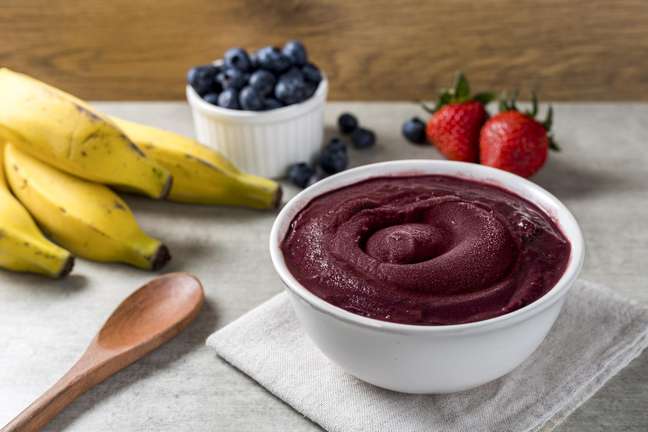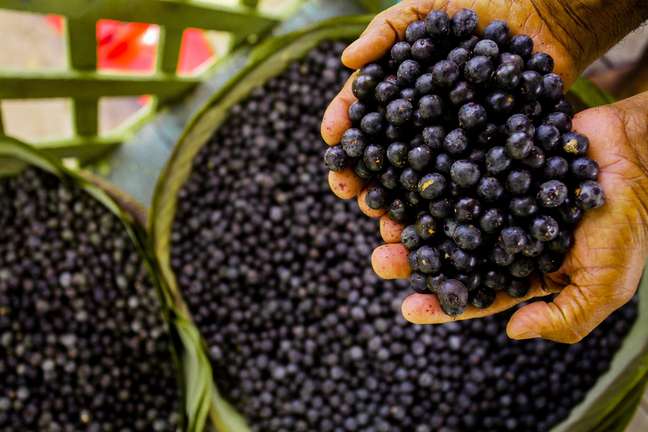Find out if the Açaí makes you fat, it hurts the liver, it transmits diseases, helps to keep it healthy and hurts diabetics
Açaí is one of the most famous and loved fruits by the Brazilians and can be consumed in different ways, one of the most famous is in the consistency of ice cream, but there is also fruit juice and can be used as an accompaniment to meals. The sky is the limit when it comes to Açaí.
The truth is that this fruit is a great source of energy and has an unparalleled flavor, but at the same time it is surrounded by controversy. There are people who think they do very well about health and there are those who think it is very harmful. But who is right?
To answer the main questions about this small purple berry, tasty spoke with two nutritionists, Gabriela Xisto and Ingrid Krichinak, to help better understand all the benefits and damage ofçaí.

Does the berry of acai hurt the liver?
Gabriela Xisto: No, actually the Açaí is a fruit full of excellent nutrients! Studies have shown that its use, together with a balanced and healthy diet, can be very interesting to prevent the development or progress of liver diseases. It is rich in anthocyanins, who have antioxidant properties, helping to combat oxidative stress in our body, and this is very important to maintain good health and prevent chronic diseases. In addition, it has a good concentration of monounsaturated and polyunsaturated fatty acids, which will help to regulate the metabolism of lipids (fat metabolism), helping for example to control cholesterol.
But it is very important to understand that we are talking about the fruit açaí, different from what we usually find there. The Acai of course does not have a sweet taste and for a better acceptance by the public, add some additives such as emulsifiers, sugar, syrups to obtain a flavor and consistency similar to ice cream. And here it is very careful: these syrups usually contain large quantities of fructose (innaturally) and this fructose can be harmful to the liver, which can lead to diseases, such as non -alcoholic steatosis (liver fat).
Does Acai make you fat?
Gabriela Xisto: 100g of pure açaí (without any additive) has about 60 kcal, instead the industrialized product is already close to 100 kcal. It is yes, an energy food, but it is possible to insert it in a healthy diet without causing weight gain. However, it is very common to consume it with the addition of other products, such as condensed milk, honey, hazelnut creams or other high -calorie density foods and in this way it can be more favorable to the increase in weight if consumed frequently.
It is important to underline that no single food has the power to increase or lose weight, as it involves other factors and food as a whole.

What are the benefits for the health of the ACAI?
Ingrid Krichinak: Açaí is a food full of B vitamins, vitamin C, iron, phosphorus, calcium, potassium, carbohydrates and fibers. In addition, being rich in antioxidants, it guarantees an anti -inflammatory action and contrasts cellular aging.
Thinking about physical exercise, Açaí can be used both in pre-training and post-workout strategies. From the pre-workout it will be used to provide the main source of energy for exercise (glucose), helping with physical performance. As a post-workout, reintegrating the energy spent during training and antioxidants help to reduce muscle stress and muscle regeneration.
Since it is a more caloric food, it is known that Açaí makes you fat. But remember, no foods fattened by itself and it is necessary to take into account its entire food context.
To adjust the Açaí in your routine according to your needs and goals, consult a nutritionist.
Does Acai berry hurt people with diabetes?
Ingrid Krichinak: Since it is a calorie and carbohydrate food, many believe that those with diabetes cannot consume Açaí. But it is possible, yes, to be consumed and adapted to the routine of this patient. It will all depend on when it is consumed, on the quantity and impact that this food has on blood sugar (these responses can be individual).
It is recommended to consume it at the end of the meal, because then the absorption will be slower and the impact also on blood sugar. Another point to be taken into consideration is the accompaniment of this Açaí, being important to avoid meatballs with Guaranà syrup and add contours rich in sugar, such as sugary condensed milk and muesli. Some replacement options: give preference to the Açaí pulp that does not have the addition of syrups and use fruit (banana, strawberry, apple), oil seeds and proteins in powder as a side dish.
But of course it is always important to consult a nutritionist to guide you and adapt according to your individuality.
Source: Terra
Benjamin Smith is a fashion journalist and author at Gossipify, known for his coverage of the latest fashion trends and industry insights. He writes about clothing, shoes, accessories, and runway shows, providing in-depth analysis and unique perspectives. He’s respected for his ability to spot emerging designers and trends, and for providing practical fashion advice to readers.








